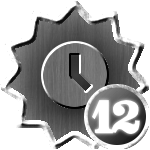
pateceramics
Members-
Posts
811 -
Joined
-
Last visited
-
Days Won
98
pateceramics last won the day on July 27 2025
pateceramics had the most liked content!
About pateceramics

Profile Information
-
Biography
I'm 33, and just got into composing over the last year or so, although, I was always the kid who made up an extra harmony part when singing along to the radio. When I was a very shy teenager, I'd sing a little harmony part when we sang at summer camp, and other people picked the part up until, suddenly we had two parts. And then I'd make up another part, and other people would pick it up too, and then there were three parts. It made me unbelievably happy.
Since I'm mainly a singer, I've been writing for a cappella choir, but when I feel a little more sure of myself I'd like to learn to write a decent piano part if nothing else.
Over the years I've had 5 violin teachers, 2 banjo teachers, a brief fling with penny whistle lessons, 3 voice teachers, and sung with 2 a cappella groups, 7 choirs, and a wee bit of musical theater which got me out of taking gym in high school. Thanks for the warm welcome to this community and your continued feedback. Can't get better without feedback! -
Gender
Female
-
Location
Malden, MA, USA
-
Occupation
contralto, potter
-
Favorite Composers
Vivaldi, Brahms, Lauridsen, Thompson, Gillian Welch
-
My Compositional Styles
Eh, you tell me.
-
Notation Software/Sequencers
MuseScore
-
Instruments Played
alto, clawhammer banjo
Recent Profile Visitors
23,902 profile views
pateceramics's Achievements
-
Starting with what you've got is a great idea. Start with whatever you already know and are comfortable with, and then you can build from there. So you can try coming up with a tune to play on guitar, and then try writing the notes down accurately using free software like Musescore. Or, the reverse, try writing something for guitar using Musescore, and then try playing it. Either will help you get better at knowing when something is a half note, or a quarter note, or a dotted eighth note. Either will help you get better at reading and writing pitches and knowing when to use accidentals, and when the sharps and flats are part of the key signature. I like the advice to start with children's songs or folk music. You could also add Christmas music to that list, or songs from summer camp, or any music that you know by heart. Anything you are very familiar and comfortable with is a good place to start. Do one or two of those, and then when you feel like you can accurately write down the notes and rhythms you want and know the basics of the composing software you are using, you can start arranging pieces, or writing your own tunes. It's like learning to read and write. We start with picture books, so we know what is going on, even if we get stuck over the reading. We start with being read to by someone else, and following along with our finger on the page, and writing letters with a pencil. We start writing short, simple sentences. Then we write short stories or poems or book reports, and can read more fluently, and we learn to use Microsoft word and type quickly, and then can write whole novels if we like. But for now, don't overthink it, just get started. 🙂
-
Just make some things. The making will lead to questions, and the combination of the questions, and the practice making will make you better over time. Don't be afraid to get started. Don't expect to be any good. You WILL be bad at this, because you have never done it before, so go ahead and start and just have fun! We call it "playing" music, so play! 🙂
-
Persichetti Exercise 4 - 5 for Women's Choir
pateceramics replied to PeterthePapercomPoser's topic in Choral, Vocal
A very fun sound world! You might be letting yourself in for some trouble at bar 13 beat 4, since all parts have big leaps simultaneously. There is a big chance of the tuning suffering in a live performance. That said, since this is a very short exercise, people could just devote a lot of practice time to that one spot. For those playing along at home, some things that might help a choir tune big leaps: 1. Use accompaniment to help singers seize the key again quickly if they miss their jump. 2. Only leap with one part at a time, so that if they don't stick the landing, the other parts will easily provide a steady foundation to help them readjust quickly. 3. Give a part a brief rest so they can prepare their vocal placement to leap more gracefully. Even just a tiny moment of disconnect will help. Here, the way you have set the text to the music gives a natural pause if you just read the line aloud, which means singers could either disconnect the two notes of the leap, (do it non legato), add an eighth rest to take a full breath, or, given the nature of the piece, even take it out of time with a longer pause (rubato) to get as much time as they need to reset vocally and have their next note firmly in mind. If someone sings your exercise, they would probably take some sort of a pause, since the text allows it, so nice job there! Also, I particularly love your first "their soul is melted." The harmony sounds very melty. 🙂 -
I made a multitrack recording of this piece too, if anyone would rather listen to that. You do have to listen to me, an alto, singing the bass line and then pitching it down a few steps using GarageBand, but it works, more or less!
-
You have a very sweet voice, and it was very fun seeing the way you had labeled sections of your piano part to get a bit of insight into how you think as you write. I do the same thing on my scores while they are in progress. Lots of little notes to self in the margins about what might come next, or other possibilities if I decide I don't like the current one. The most obvious way to shrink the range would be some key changes for either the highest or lowest vocal sections. You are writing in a style where that would fit in very smoothly.
-
Prelude no.14 - Live Performance by Henry Ng
pateceramics replied to Thatguy v2.0's topic in Piano Music, Solo Keyboard
I'm always a fan of the minor and the modal, and agree with the rest of the room that the surprise C# is a particularly nice moment! If I had one wish, I think it would be nice to play around with something every so slightly different in the left hand the third time through bar one and two instead of doing an exact repeat of that material. We've gone on such a journey by that point, that to evolve, just by a note or two so the listener wonders what has changed, might be interesting to play with. This is really wonderful, and Henry's playing is very tender with excellent phrasing and use of rubato. Bravo to you both! -
Thanks Henry! Yes, this piece was all about word painting to tell the story, so we start off stuffy and formal, like a formal business letter, and then are surprised with creepy, agitated eighth notes and a spider. My main challenge was trying to make the piece feel cohesive, since there isn't a strict melody or even a single short motif that holds it together. What does repeat are some textures: anxious eighth note sections for the piano at m. 13 and 47, and striding up by quarter note thirds and fourths at m.18 and 52 (the second time fancied up with an added octave and then some dotted eighth rhythms. Hopefully the final result isn't too chaotic. Or is just chaotic enough for suddenly realizing you are holding a live, struggling spider in your hand. Thanks for your thoughts!
-
Fun! I wonder if it would make a cleaner score to change the meter and tempo in some places instead of having so many -uplets. For example, from measure 71 to the end, you have nothing but triplets in the violin part. They are never set up in opposition to a duple, so you don't absolutely have to have triplets there. Instead, you could just write that section in a 6/8 meter or a 12/8 meter, make all the triplets into eighth notes, the quarter notes into dotted quarter notes, and the half notes into dotted half notes, and then use a tempo change to get the speed to match the section that came before. It would sound exactly the same, but might look a little more intuitive on the page to performers. I like the brass interjections too!
-
That is definitely a NICE sound set and I like your harmonies very much. It may break convention a bit (I'm not a theorist, so I'll leave that to others), but it seems very singable. Bravo!
-
Furtak-The Spider.mp3 An epistolary work for choir with piano accompaniment. And yes, I did pluck a little clump of dog hair out of a box I was mailing that wriggled and turned out to be a small spider. The spider was released back into the basement, which I'm sure it and the person receiving the box were both grateful for. Thanks for taking a listen! My dear Sir, It may please you to know that this box does not contain a spider. A bit of fluff, pinched out 'twixt thumb and finger, pushed back in desperate protest, unspooling thread-fine legs, and we saw each other face to face, both equally surprised, and so I send your order and a reminder from the spider, who was not mailed to California, that when the hand of Fate plucks you up, beat with your tiny fist, and sometimes the grip relaxes, and Fortune herself will stare in shock at your small soul looking up.
-
Harvard's Ferris Choral Fellows, directed by Carson Cooman, Harvard's Composer in Residence, were kind enough to use this piece in a Morning Prayer service at Memorial Church. They sang the a cappella SATB version of this piece, so I thought I would share the recording here. Enjoy!
- 4 replies
-
- maundy thursday
- good friday
-
(and 7 more)
Tagged with:
-
Sometimes I put things away for a while. Sometimes I don't come back to them because they really weren't working, but something else will. Oh, well. There's always the next one... 🙂
-
Do you have music in the works for this one, Brianna? It looks like a good start!
-
My piece is more serious in tone, but I do like PDQ Bach. "Found a peanut!" Least expected opening line of an opera ever. 🙂
- 6 replies
-
- wildlife rescue
- satb
-
(and 2 more)
Tagged with:
-
I've been going through older pieces and making multitrack recordings of them with myself singing all the parts. Hopefully this provides a better sense of the piece, even with an alto singing the bass line, and some resulting sound distortion from Garageband's transpose feature...




.thumb.png.8b5b433a341551e913a34392660bc95b.png)






